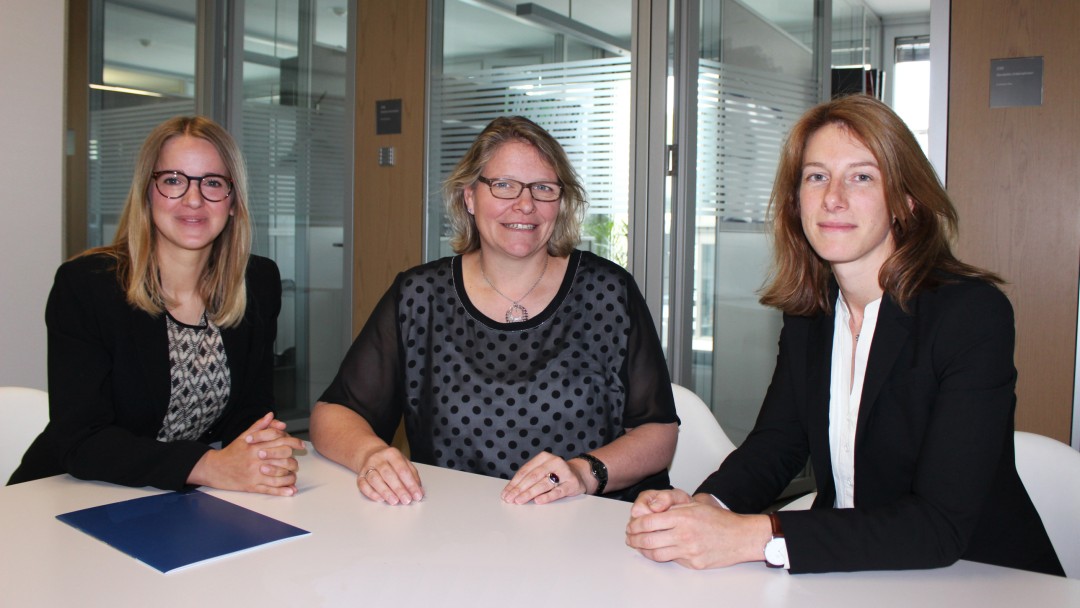News from 2015-05-22 / DEG
Spotlight on DEG's commitment in the financial sector
For many years DEG has been financing banks and financial institutions in developing countries. What are the reasons for it?
Gudrun Busch: Setting up financial institutions in developing countries significantly contributes to the country's economic development. Only with well-functioning financial intermediaries can a country develop. In addition DEG, through its involvement in banks and financial institutions, can reach end customers that it cannot finance directly. These are mostly small-and medium-sized enterprises (SME), which are the backbone of the economy in many countries. But particularly in developing countries it can be especially difficult for SMEs to obtain the long-term capital needed for their investments and working capital. That is why we provide banks and investment companies with long-term funds so that they can provide financing to small and medium-sized companies.
What are the particular challenges facing the financial sector in developing countries?
Jana Lessenich: That depends on the extent to which the financial sector is developed in the country in question and on how well the local banking supervision is structured.
The financial sector in the least developed countries often lacks functioning structures. Emerging countries,however, face different challenges, for example if the state dominates the banking sector or if existing regulations are ineffective. DEG is in a position to serve all countries at different stages of development according to their needs.
Gudrun Busch: In addition, risks in the financial sector may change rapidly. Brazil, for example, has a well developed banking sector. The country nevertheless has to face the fact that the economy has grown less strongly than initially assumed. Consequently, risks associated to bank financings there have increased.
What does DEG do to ensure that banks co-financed by it comply with environmental and social standards?
Gudrun Busch: Prior to financing a bank, we classify it according to the potential degree of risk: high, medium or low. If we believe that a bank is exposed to high risk, our Sustainability department concludes an environmental and social impact analysis, sometimes also in combination with on-site visits. Banks co-financed by us agree to implement environmental and social management systems and to adhere to the IFC Performance Standards.
Meike Goetze: If there are still deficits, we additionally offer advisory measures, which are meant to help the banks further develop their environmental and social standards.
In cooperation with other European development finance institutions we additionally encourage banks in countries such as Bangladesh, Nigeria and Kenya to form associations in order to strengthen their awareness of environmental and social standards. We encourage them to agree equal conditions between themselves and to spread this awareness to the political sphere.
Last year, DEG developed its advisory services for financial institutions further. What's new for the DEG customers?
Meike Goetze: We developed a two-phase advisory programme for SME. During the first phase – the SME Needs Assessment - a consultant commissioned by us visits the bank in order to get to know its SME operations. The consultant looks at, among other things, the products and financial services that the bank offers its SME customers, at market developments and at the bank's strategy. A report is subsequently prepared, summarising concrete short- and medium-term measures that are designed to help the bank improve and further develop its SME operations.
Jana Lessenich: We also assist the banks to implementing these medium-term measures, by offering technical assistance.
Gudrun Busch: This new offer has been well received by our customers.
What are the benefits of this SME Needs Assessment for the participating financial institutions?
Jana Lessenich: What is special about the SME Needs Assessment is that a detailed customer-specific roadmap is developed which is based on the customer's needs. This roadmap shows step by step how the financial institution is able to further develop its SME operations in order to attract more SME customers and to improve its services.
Meike Goetze: This cooperation makes it possible to gain a better understanding of the specific operations of a customer in order to provide even more tailor-made advice. The SME Needs Assessment in particular focuses on development potential and earning opportunities.
What are the costs involved and who covers these?
Meike Goetze: The Assessment usually costs between EUR 15,000 and EUR 20,000. DEG bears the costs related to the advisory services of the consultant. The customer only has to cover the consultants' travel and accommodation costs.
Gudrun Busch: Costs are thus relatively low, whereas the impact that customers can achieve through this measure is very high.
Gudrun Busch has many years of finance experience with banks and financial institutions. She has been heading DEG's Financial Institutions department since January 2013.
Jana Lessenich has more than 15 years experience working in the financial sector. In DEG's Financial Institutions department she is responsible for coordinating and developing SME promotion.
Meike Goetze has many years of experience in the area of “Access to Finance“ in DEG's.


Share page
To share the content of this page with your network, click on one of the icons below.
Note on data protection: When you share content, your personal data is transferred to the selected network.
Data protection
Alternatively, you can also copy the short link: https://www.deginvest.de/s/endBZF67.BDZA
Copy link Link copied